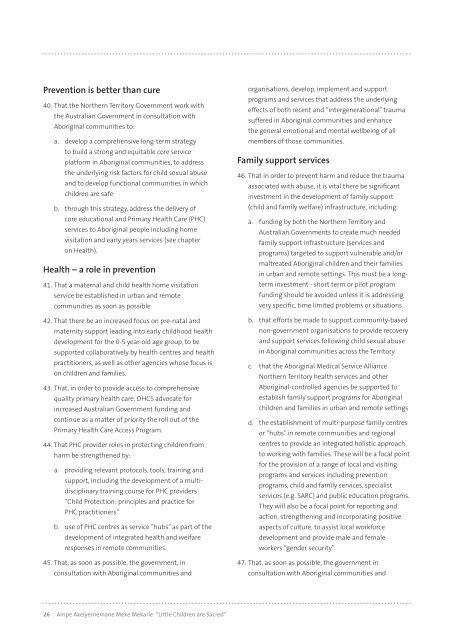bipacsa_final_report
bipacsa_final_report
bipacsa_final_report
Create successful ePaper yourself
Turn your PDF publications into a flip-book with our unique Google optimized e-Paper software.
Prevention is better than cure<br />
40. That the Northern Territory Government work with<br />
the Australian Government in consultation with<br />
Aboriginal communities to:<br />
a. develop a comprehensive long-term strategy<br />
to build a strong and equitable core service<br />
platform in Aboriginal communities, to address<br />
the underlying risk factors for child sexual abuse<br />
and to develop functional communities in which<br />
children are safe<br />
b. through this strategy, address the delivery of<br />
core educational and Primary Health Care (PHC)<br />
services to Aboriginal people including home<br />
visitation and early years services (see chapter<br />
on Health).<br />
Health – a role in prevention<br />
41. That a maternal and child health home visitation<br />
service be established in urban and remote<br />
communities as soon as possible.<br />
42. That there be an increased focus on pre-natal and<br />
maternity support leading into early childhood health<br />
development for the 0-5 year-old age group, to be<br />
supported collaboratively by health centres and health<br />
practitioners, as well as other agencies whose focus is<br />
on children and families.<br />
43. That, in order to provide access to comprehensive<br />
quality primary health care, DHCS advocate for<br />
increased Australian Government funding and<br />
continue as a matter of priority the roll out of the<br />
Primary Health Care Access Program.<br />
44. That PHC provider roles in protecting children from<br />
harm be strengthened by:<br />
a. providing relevant protocols, tools, training and<br />
support, including the development of a multi-<br />
disciplinary training course for PHC providers:<br />
“Child Protection: principles and practice for<br />
PHC practitioners”<br />
b. use of PHC centres as service “hubs” as part of the<br />
development of integrated health and welfare<br />
responses in remote communities.<br />
45. That, as soon as possible, the government, in<br />
consultation with Aboriginal communities and<br />
Ampe Akelyernemane Meke Mekarle “Little Children are Sacred”<br />
organisations, develop, implement and support<br />
programs and services that address the underlying<br />
effects of both recent and “intergenerational” trauma<br />
suffered in Aboriginal communities and enhance<br />
the general emotional and mental wellbeing of all<br />
members of those communities.<br />
Family support services<br />
46. That in order to prevent harm and reduce the trauma<br />
associated with abuse, it is vital there be significant<br />
investment in the development of family support<br />
(child and family welfare) infrastructure, including:<br />
a. funding by both the Northern Territory and<br />
Australian Governments to create much needed<br />
family support infrastructure (services and<br />
programs) targeted to support vulnerable and/or<br />
maltreated Aboriginal children and their families<br />
in urban and remote settings. This must be a long-<br />
term investment - short term or pilot program<br />
funding should be avoided unless it is addressing<br />
very specific, time limited problems or situations<br />
b. that efforts be made to support community-based<br />
non-government organisations to provide recovery<br />
and support services following child sexual abuse<br />
in Aboriginal communities across the Territory<br />
c. that the Aboriginal Medical Service Alliance<br />
Northern Territory health services and other<br />
Aboriginal-controlled agencies be supported to<br />
establish family support programs for Aboriginal<br />
children and families in urban and remote settings<br />
d. the establishment of multi-purpose family centres<br />
or “hubs” in remote communities and regional<br />
centres to provide an integrated holistic approach<br />
to working with families. These will be a focal point<br />
for the provision of a range of local and visiting<br />
programs and services including prevention<br />
programs, child and family services, specialist<br />
services (e.g. SARC) and public education programs.<br />
They will also be a focal point for <strong>report</strong>ing and<br />
action, strengthening and incorporating positive<br />
aspects of culture, to assist local workforce<br />
development and provide male and female<br />
workers “gender security”.<br />
47. That, as soon as possible, the government in<br />
consultation with Aboriginal communities and


